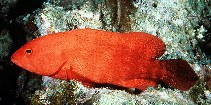| Family: |
Epinephelidae (Groupers) |
| Max. size: |
28 cm TL (male/unsexed) |
| Environment: |
reef-associated; marine; depth range 0 - 60 m |
| Distribution: |
Indian Ocean: From East coast of Africa (Kenay to South Africa) to Sumatra; Comoros Is., Mascarene Is., Maldives, Sri Lanka, Chagos I. |
| Diagnosis: |
Dorsal spines (total): 9-9; Dorsal soft rays (total): 14-16; Anal spines: 3-3; Anal soft rays: 8-9. Characterized by red color grading to dark brown on posterior part of the body; posterior edge of operculum with prominent brown "ear" spot; body scales ctenoid, including abdomen; greatest depth of body 2.7-3.1 in SL; rounded caudal fin; pelvic fins 1.8-2.2 in head length (Ref. 90102); interorbital area convex; rounded preopercle, finely serrate, lower edge fleshy; subopercle and interopercle usually smooth; maxilla reaching well past eye (Ref. 089707). |
| Biology: |
Common throughout its range, the species inhabits coral-rich areas. It feeds on small fishes and crustaceans (Ref. 89707). Solitary (Ref 90102). |
| IUCN Red List Status: |
Least Concern (LC); Date assessed: 15 January 2018 Ref. (130435)
|
| Threat to humans: |
harmless |
Source and more info: www.fishbase.org. For personal, classroom, and other internal use only. Not for publication.
